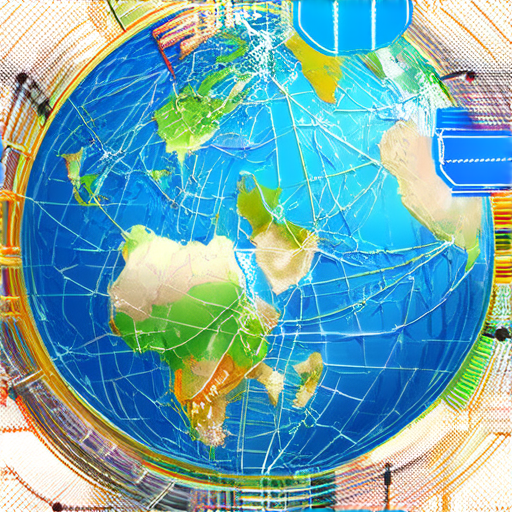As the world becomes increasingly interconnected, understanding international trade has never been more crucial for businesses, economies, and individuals alike. With its far-reaching impact on global commerce and economic growth, international trade has become a vital component of modern-day business operations. From facilitating the exchange of goods and services across borders to fostering economic cooperation among nations, international trade plays a pivotal role in shaping the world we live in today.

What is Meant by International Trade?
International trade is an exchange involving a good or service conducted between at least two different countries.
- The exchanges can be imports or exports.
Import vs Export:
- An import refers to a good or service brought into the domestic country.
- An export refers to a good or service sold to a foreign country.
Benefits of International Trade:
- Increased economic growth through increased production and employment opportunities.
- Access to a wider variety of goods and services.
- Improved standard of living due to lower prices and greater availability of products.
- Cultural exchange and understanding between nations.
Examples of International Trade:
- The United States importing oil from Saudi Arabia.
- The European Union exporting cars to Japan.
- China exporting electronics to the United States.
Key Players in International Trade:
- Exporters: Companies that sell goods or services to foreign markets.
- Importers: Companies that buy goods or services from foreign markets.
- Government agencies: Responsible for regulating and facilitating international trade.
- Banks and financial institutions: Provide financing and risk management services for international trade transactions.
Challenges Faced by International Trade:
- Tariffs and trade barriers: Taxes imposed on imported goods or restrictions on trade.
- Currency fluctuations: Changes in exchange rates can affect the cost of imports and exports.
- Transportation costs: High costs associated with shipping goods across long distances.
- Regulatory differences: Different laws and regulations governing trade in various countries.
Conclusion:
International trade plays a vital role in the global economy, offering numerous benefits and opportunities for economic growth, cultural exchange, and improved standards of living.
What are the 3 types of international trade?
International trade can be categorized into three primary types: Export Trade, Import Trade, and Entrepot Trade.
-
Export Trade
Export trade involves the sale of goods or services produced in one country to another country. This type of trade helps countries to increase their foreign exchange earnings and promotes economic growth.
- Examples of export trade include:
- Manufactured goods such as electronics, textiles, and machinery
- Agricultural products such as coffee, cocoa, and spices
- Services such as tourism, consulting, and financial services
-
Import Trade
Import trade involves the purchase of goods or services produced in one country from another country. This type of trade helps countries to meet their domestic demand for goods and services that are not produced locally.
- Examples of import trade include:
- Raw materials such as oil, gas, and minerals
- Capital goods such as machinery and equipment
- Consumer goods such as food, clothing, and household items
-
Entrepot Trade
Entrepot trade involves the buying and selling of goods within a country without changing their ownership. This type of trade is often carried out through warehouses or trading companies.
- Examples of entrepot trade include:
- The re-export of goods from one country to another
- The storage and distribution of goods within a country
- The provision of logistics and transportation services
In conclusion, international trade plays a vital role in promoting economic growth and development among countries. Understanding the different types of international trade is essential for businesses and individuals involved in global commerce.

What is an International Trade Job?
An international trade job involves working with companies to facilitate the buying and selling of goods and services across national borders.
-
Key Responsibilities:
- Tracking global trends and assessing demand for an organization’s products or services
- Identifying competitors and potential customers in international markets
- Negotiating trade agreements and contracts with foreign partners
- Coordinating logistics and transportation of goods between countries
- Ensuring compliance with import and export regulations
-
Types of International Trade Jobs:
- International Trade Specialist: Responsible for managing international trade operations, including negotiating trade agreements and coordinating logistics.
- Export Manager: Oversees the process of exporting goods and services to foreign markets.
- Import Manager: Manages the process of importing goods and services from foreign markets.
- Global Supply Chain Manager: Coordinates the movement of goods, services, and information across international borders.
-
Skills and Qualifications:
- Bachelor’s degree in international business, economics, or a related field
- Proficiency in languages such as Spanish, Mandarin, Arabic, or Portuguese
- Knowledge of international trade laws and regulations
- Strong analytical and problem-solving skills
- Ability to communicate effectively with people from diverse cultural backgrounds
As an international trade professional, you’ll have the opportunity to work with companies from various industries, including manufacturing, retail, and finance. You’ll need to stay up-to-date with changing market conditions, trade policies, and regulatory requirements to succeed in this role.
Some of the top companies in the international trade industry include Maersk , DHL , and China Export .
By pursuing a career in international trade, you can develop valuable skills and knowledge that will enable you to navigate the complexities of global commerce and contribute to the growth of businesses around the world.

Why International Trade is Crucial
As a global citizen, I believe that international trade plays a vital role in connecting people, cultures, and economies worldwide.
-
Increased Access to Goods and Services
Through international trade, countries can tap into a vast array of goods and services that might not be readily available locally, fostering economic growth and development.
-
Competitive Pricing and Cheaper Products
The increased competition brought about by international trade leads to lower prices and better-quality products, benefiting consumers and businesses alike.
-
Cultural Exchange and Understanding
International trade facilitates the exchange of ideas, customs, and values between nations, promoting cross-cultural understanding and cooperation.
-
Economic Growth and Job Creation
By expanding markets and increasing trade volumes, countries can stimulate economic growth, create jobs, and reduce poverty levels.
-
Improved Standard of Living
Access to a wider range of goods and services through international trade enables individuals to enjoy a higher standard of living, improved healthcare, and better education.
Some notable examples of successful international trade agreements include the World Trade Organization (WTO), the North American Free Trade Agreement (NAFTA), and the European Union’s Single Market.
When it comes to navigating the complexities of international trade, companies like World Trade Organization and Export.gov offer valuable resources and expertise.
Additionally, organizations like International Monetary Fund and World Bank play crucial roles in promoting global economic stability and cooperation.
As we continue to navigate the intricacies of international trade, it’s essential to prioritize transparency, fairness, and sustainability to ensure that the benefits of trade are shared equitably among all nations and stakeholders.
Benefits of International Trade
As a global citizen, I’m excited to explore the advantages of international trade.
-
Economic Growth
When countries engage in trade, they can specialize in producing goods and services in which they have a comparative advantage. This leads to increased productivity, lower prices, and higher standards of living.
-
Increased Efficiency
International trade allows countries to take advantage of economies of scale, leading to reduced costs and improved product quality. By specializing in certain industries, countries can become more efficient and competitive in the global market.
-
Cultural Exchange
Trade facilitates cultural exchange between nations, promoting understanding and cooperation. As people from different cultures interact through trade, they learn from each other’s customs, traditions, and values.
-
Access to New Markets
International trade provides businesses with access to new markets, customers, and revenue streams. By exporting goods and services, companies can tap into emerging markets and increase their global presence.
-
Improved Standard of Living
Trade helps to reduce poverty and improve living standards by increasing access to affordable goods and services. As countries trade with each other, they can share knowledge, technology, and resources, leading to better healthcare, education, and infrastructure.
-
Job Creation and Employment Opportunities
International trade creates jobs and stimulates economic growth by increasing demand for goods and services. As trade expands, businesses need to hire more workers to meet the growing demand, leading to employment opportunities and career advancement.
-
Increased Competition and Innovation
Trade promotes competition and innovation by introducing new products, technologies, and business models. As companies compete in the global market, they are forced to innovate and improve their products and services to stay ahead of the competition.
-
Reduced Prices and Increased Affordability
International trade leads to reduced prices and increased affordability of goods and services. By importing goods from countries with lower production costs, consumers can enjoy lower prices and improved quality.
-
Environmental Benefits
Trade can promote sustainable development and environmental protection by encouraging the adoption of eco-friendly technologies and practices. As countries trade with each other, they can share knowledge and expertise on sustainable development and environmental conservation.
By embracing international trade, we can create a more interconnected and prosperous world, where everyone has access to the benefits of globalization.

What is an Example of International Trade?
International trade refers to the exchange of goods and services between countries.
- The United States imports coffee beans from Brazil, which are then roasted and packaged for distribution in American stores.
- A Japanese automaker exports cars to the European market, where they are sold through local dealerships.
- An Indian textile manufacturer ships clothing to retailers in the Middle East, who sell the garments to consumers.
Key Players Involved in International Trade:
- Exporters: Companies that produce goods or services for sale abroad.
- Importers: Businesses that purchase foreign-made products for resale or consumption.
- Freight Forwarders: Logistics companies that coordinate the transportation of goods between countries.
- Customs Brokers: Experts who facilitate the clearance of imported goods through customs.
Benefits of International Trade:
- Economic Growth: Increased trade can lead to job creation, higher incomes, and improved living standards.
- Increased Competition: Global markets promote competition, driving innovation and better product quality.
- Cultural Exchange: International trade fosters cross-cultural understanding and cooperation.
By understanding the complexities of international trade, individuals and businesses can navigate the global marketplace with confidence, capitalizing on opportunities and building strong relationships with partners around the world.

0 Comments